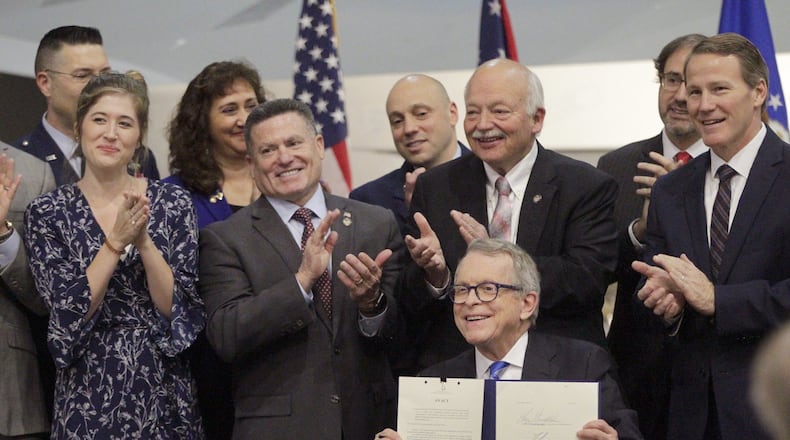“We were in Florida,” Zeis said in an interview. “And we moved up here. Because this was where we always wanted to live.”
Quality of life, a lower cost of living, employment and education opportunities and more beckoned, as far as Zeis and his family were concerned. An Air Force Academy graduate who went to law school and enjoyed stints at the Dayton Development Coalition and the law firm Sebaly, Shillito & Dyer, Zeis landed his role on DeWine’s cabinet early in 2019.
But people not familiar with Wright-Patterson scratched their heads at the decision, Zeis recalled, not quite understanding why he would want to trade Gulf Coast beaches for sometimes cold weather.
Others understood immediately.
“The ones who had been to Wright-Patt — do you know what they said to me?” Zeis recalled. “They said, ‘Joe, yeah, absolutely. We’re going to do the same thing.’”
‘It’s important for the economy’
Boosting Ohio’s profile for military families and defense-oriented businesses isn’t new for Buckeye State advocates. State leaders have shepherded and approved dozens of bills in recent years seeking to make the state more attractive to military personnel, their families and retirees.
In fact, Greene County Commissioner Rick Perales, a former state representative and a 15-year Air Force veteran, counts some 60 relevant bills in his eight years in the Ohio House. Perales served as chairman of the House Armed Services and Veterans Affairs Committee, as well as on the Ohio Aerospace and Aviation Technology Committee.
“As a military veteran, with four brothers who served and a father who served, that was my passion,” Perales said.
Almost 750,000 veterans live here, making Ohio sixth in the nation for the size of its veteran population, said Maj. Gen. Deborah Ashenhurst, director of Ohio’s Department of Veteran Services and a retired leader of the Ohio National Guard.
The upshot isn’t complicated. If a state is welcoming to military families, the Department of Defense notices. And if the DoD notices, then so do defense-sector companies.
“There is a direct connection between these efforts and economic development,” said Jeff Hoagland, president and chief executive of the Dayton Development Coalition. “The proximity to Wright-Patt is a big part of what makes our region attractive to the defense sector. A company’s ability to easily connect with Air Force leadership and program staff is a key reason these companies choose Dayton. If those programs leave Wright-Patt, we could also lose their contractors.”
Last year, the state’s private jobs creation arm, JobsOhio, added federal and military employers to its list of strategic industries deserving attention.
But Wright-Patterson Air Force Base and allied defense firms have always been a concern of the Dayton Development Coalition (which is the regional partner for JobsOhio) and for good reason — the base, Ohio’s largest single site employer, accounts for nearly 90 percent of federal defense-related employment in the area, according to JobsOhio.
The region’s federal military operations also include the Ohio Air National Guard base in Springfield and other guard and reserve units.
In total, they employ more than 33,000 people and have a payroll of $2.6 billion, JobsOhio CEO JP Nauseef has noted. The region’s federal assets also include the Dayton Veterans Affairs Medical Center.
“It’s important for the economy in Ohio,” Ashenhurst said. “We have a lot of businesses that want to be productive in Ohio, and their productivity is based on getting the right workforce, and enough of the right workforce to be able to run their business.”
‘The DoD carefully tracks these efforts’
In a virtual signing ceremony in June last year, DeWine signed House Bill 16, a bill expected to benefit Wright-Patterson families who move into Ohio but don’t automatically qualify for lower in-state college tuition reserved for longtime state residents.
The rationale for the change was simple: Make Ohio more attractive to military families, Perales said at the time of the signing.
“This is getting to be in the top five, if not the top three, of the most military friendly states in the union,” Perales, a Beavercreek Republican, said then.
Also signed in June with the same goal in mind: House Bill 287, which will allow reciprocity for Medicaid home and community-based service waivers for active-duty military family members with special needs when families move to Ohio for military assignments.
The governor also signed Ohio Senate Bill 7 in a January 2020 visit to the National Museum of the U.S. Air Force. That bill requires state occupational licensing agencies to issue temporary licenses or certificates to uniformed service members and their spouses who are validly licensed in another jurisdiction and have moved to Ohio for military duty.
That bill often saves family members a great deal of time and money, sparing them the need to secure new occupational licenses.
One milestone change: Retirement pay received for service on military active duty or the National Guard or Reserves, as well as pay received by surviving spouses, has been exempt from the Ohio income tax since 2008.
“That’s when we kind of turned a corner,” Perales said. “Because no retiree, or very few, will retire somewhere where they’re going to tax your retirement when there are other areas just as nice.”
Legislators “took it on,” comparing Ohio to other states and trying to make sure “that we’re better,” Perales said.
“And I think we have come a long ways toward that,” Perales said. “But we have a long ways to go.”
Uniformed members of the military go where they are assigned. But the military still pays close attention to these types of laws, Hoagland said.
“The military has made it very clear that it will use its leverage as a local economic driver to improve the family-friendly laws and regulations that affect its service members,” the coalition CEO said. “In other words, in order for Ohio to remain competitive with other states to gain new military jobs, we need to enact legislation that supports military spouses and families.”
About the Author

